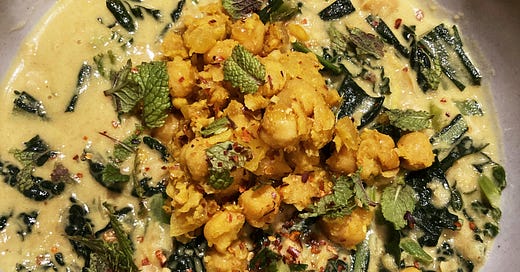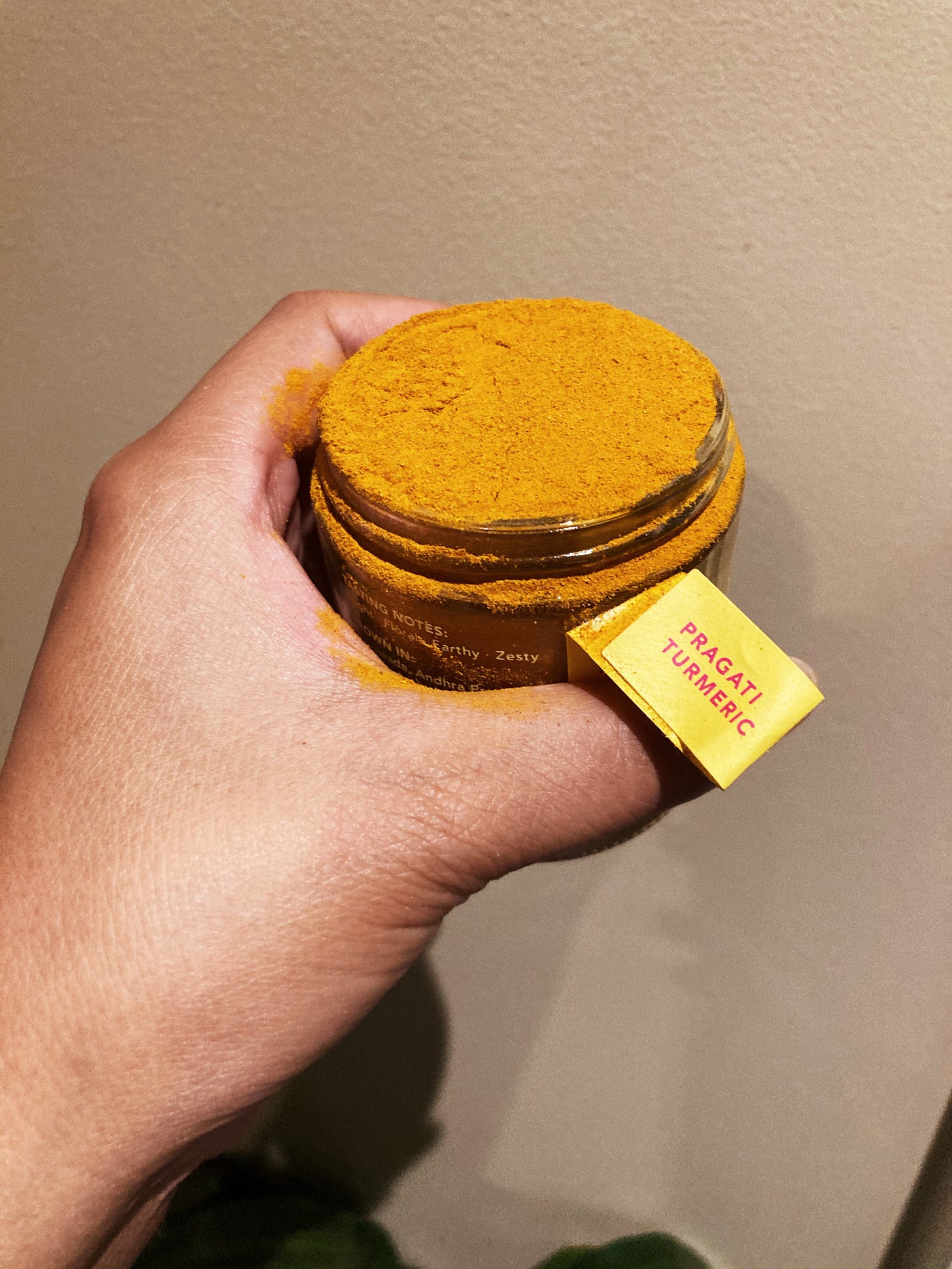Turmeric chickpea stew, and the origins of spices.
Adapted from: chana masala, the Indian chickpea dish.
Many a bunch of kale had gone to waste in my fridge, yellowed and wilted, before I found Alison Roman’s infamous recipe for #TheStew. At the time, it seemed to me like nothing more than a delicious way to use up a bunch of greens and pantry staples—the recipe calls for chickpeas and coconut milk—without the need for much else. I made it a handful of times before I’d ever stopped to consider what exactly I was making. It’s so easy to jump right into the consumption of something without understanding it; ignorance is effortless that way.
When popular food outlets publish recipes and gloss over their historical origins, they’re enabling that ignorance. When Alison Roman claims that the stew was never a curry and adds dismissively, “I don’t come from a culture that knows about curry,” she is capitalizing on the ignorance. All of a sudden, a lack of culture becomes a selling point. A seminal dish of the Indian subcontinent is given a slight twist and rebranded as the ingenuity of a white cook. Would the world’s best Indian curry go viral in North American food media? Never. But The Stew (an un-intimidating and culturally agnostic word) did.
Spiced Chickpea Stew with Coconut and Turmeric - Alison Roman for the NYT
This stew is, in fact, a curry. A good one, on its own merits. It is a coconut milk chana malasa with greens thrown in. The spices in Roman’s recipe are pared back, simplified; turmeric is the prominent hero. I’m not here to ascribe maliciousness or deliberate white-washing, but it seems evident to me that when your recipe hangs on turmeric of all spices, you can’t claim it as a product of your own experimentation.
“In the same way civilizations were built by slave labor and human bondage, so were they shaped by a desire for spice,” wrote Roxana Hadidi, in a piece critiquing Roman and the ethnic erasure in food culture that she represents. A failure to acknowledge the cultural traditions attached to certain spices and recipes, she argued, “is colonialism as cuisine.” In my efforts to retrace the cultural origins of the recipes I make, spices are often the way-finders; to understand where a spice is grown and produced is to see a hint of a recipe’s heritage. Turmeric, for example, is primarily produced in India, and has been an essential element of Indian and Southeast Asian cultures for thousands of years. It is unsurprising, then, that a turmeric chickpea stew might find its cultural roots in Indian cuisine.
Admittedly, there are bigger forces at work than a lack of attribution. Ours is a culture that cares more about getting things and how quickly we can get them, than the intricacies how they got there, or what it takes to make it happen. We balk at the cost of artisan ceramics because we’re used to buying $10 plates from Urban Outfitters. We buy turmeric at the grocery store and we have absolutely no idea where it comes from, or how long ago it was made, or what turmeric really is. We inhabit a world of cheap, fast consumption that is only justifiable through a deliberate ignorance, an erasure of the pains and true costs of production. We do not want to see the ugliness that makes our desires affordable to us. The food world, as we all know and only sometimes allow ourselves to acknowledge, is full of that ugliness.
When I made The Curry last week, I had a wilting bunch of kale in the fridge and had just received my order from Diaspora Co., a small spice company founded to de-colonialize the Indian spice trade and return power to its spice farmers. Their mission excites me; the spices are single-origin, sourced directly from farms committed to regenerative and sustainable agriculture. The Pragati turmeric they offer is grown and harvested in Vijayawada, by a self-taught organic farmer. It does for yellow what Yves Klein did for blue, which is to say, made it transcendental. One whiff, and this turmeric immediately disqualified every turmeric that came before it. It is to grocery store turmeric what a real life painting is to a black and white printout. Vibrant, pungent, so incredibly aromatic. I never want to use anything else.
I know am privileged to be able to support a company like Diaspora Co. I know it’s a lot to ask of anyone, to pay $20+ for a jar of spice when you can get a bag of it from the store for a fifth of the cost. But when it comes to cooking, I value how a good quality spice can bring saturation to a whole dish, and when it comes to living, I value what little difference I can make by rerouting my disposable income to companies that prioritize equitable exchange. These may not be decisions that you want to or can afford to make, and that’s entirely fair. But the more I make these choices, the more it feels like I don’t really have a choice.
The power imbalances that govern our world seem insurmountable, and awareness begets despair more than anything else. But these days, ignorance is not neutrality; it is to side with the very systems we critique. I am not delusional enough to think of buying expensive turmeric as “doing my part,” but it’s a start. It feels like something, to continue to make decisions that reflect my own principles, even if these choices are tiny and insignificant unto themselves: Researching the forgotten history of an ingredient and the people that brought it to the rest of the world. Paying someone a fair price for it. Telling you about it, so that you might, too. Like I said, small. But I am hopeful that their effects are cumulative. That they might, eventually, add up to a life.
Traditional takes on chickpea curries:
• South-Indian Chickpea Curry, via Holy Cow Vegan - like Roman’s recipe, this features coconut milk, but with a lot more traditional Indian spices and tomatoes.
• A spice-forward Chana Masala, via Cooking with Manali
• Throw some eggplant into the mix, with this recipe from May I Have That Recipe (I will never cease to be delighted by food blog names).
*Clears throat* Adapted From is moving to a biweekly schedule, because pandemic burnout is real, and so is the cyclical cooking-cleaning soul drain. You can always reach me, however, by replying to these emails.
Until next time,
Tracy




